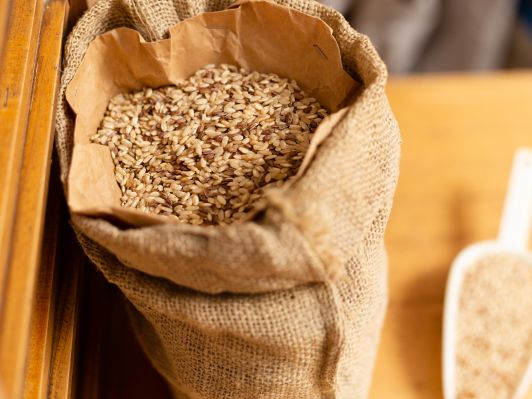In today’s dynamic economic landscape, finding effective ways to save money is essential for households across the UK. One significant area where savings can be made is food shopping. As prices fluctuate and budgets tighten, adopting savvy strategies for cutting down on food expenses can have a substantial impact on overall financial well-being.
This guide delves into practical and smart approaches that individuals and families can employ to trim their food shopping bills without compromising on the quality and nutritional value of their meals. With these tips, you can eat well without breaking the bank.
Crucial Tips For Saving Money on Food Shopping
1. Plan Your Meals and Create a Shopping List

One of the most effective ways to save money on your supermarket shop is by planning your meals ahead of time. Take some each week time to meal plan for breakfast, lunch, dinner, and snacks. Meal planning can help you:
- Save on expenses. By creating a meal plan in advance, you can make a thorough shopping list based on your needs.
- Avoid food waste. Meal planning can minimise waste, which is one of its most important advantages.
- Efficient ingredient use. Meal planning makes using ingredients effectively across numerous recipes possible.
- Better portion control: When you plan meals ahead of time, you can manage portion proportions, reducing leftovers and keeping your mates pleased on any future dinners.
- Avoid impulse buying. A shopping list can help you avoid spontaneous purchases and reduce the likelihood of buying items you don’t actually need.
2. Shop Smart and Compare Prices

Shopping wisely and checking costs are crucial when it comes to saving money on your food shopping and grocery budgeting. Some tips for smart shopping to save money on food shopping include:
- Don’t confine yourself to a single supermarket shopping trip. Prices for the same things might differ between local shops.
- Doing your food shop online can be a convenient and cost-effective way to purchase groceries. People use it to compare costs online vs. in-store prices, use vouchers, and steer clear of the impulsive buys that frequently happen while doing in-person supermarket shopping.
- Comparing online prices is simpler than ever. Thanks to several applications and websites, you can compare costs between different businesses and even online retailers. A few websites that will help customers compare grocery prices across most supermarkets include Compareon, Priceable, and numerous others.
- Coupons, loyalty programs, and cashback apps can help you save money on grocery shopping. Although discounts and special offers might be appealing and save money on the food shop remember to stick to your shopping plan. Effective money management involves finding a balance between savings and actual needs.
3. Buy in Bulk and Use Store Brands

Buying things in bulk and choosing store-brand products are two effective ways to save money on your weekly food shop.
The bulk purchase prices are frequently lower per unit, which over time can result in significant savings. This is true for basic foods like rice, pasta, canned items, and cereals.
Store-owned products often cost less since there are fewer expenditures for marketing and promotion. This enables you to save money on food and other necessities for daily life.
If you decide to buy in bulk, it’s important to maintain their freshness and quality. Here’s how:
- Airtight containers: Store bulk supplies in airtight containers to keep moisture and pests from contaminating the food. A few excellent options include mason jars, plastic containers, and reusable bags with closures.
- Proper storage: Bulk materials should be kept in a cool, dry location away from the sun. It hinders the development of germs and mould.
- Labelling: Write the item’s name and the date of purchase on containers to minimise food wastage.
- Rotation: Practice rotating using the first-in, first-out strategy. To do this, use the older stuff or the items with the shortest best-before date first, to stop them from going bad.
4. Embrace Seasonal and Local Produce
A great way to save money on food shopping and enjoy fresh food and fresh fruit is by choosing seasonal and locally produced products. This strategy is advantageous for your grocery bill as well as local farmers and a more sustainable food supply.
You can check out many of the major supermarkets in the UK, offering affordable yet fresh seasonal food. Plus, fresh vegetables grown locally may be found in abundance at farmers’ markets.
As the use-by date approaches, you might find that supermarkets offer discounts on perishable foods in the early evening.
5. Reduce Meat Consumption and Opt for Alternatives
Switching to a diet that consumes less meat can result in considerable ways to save money on food. Including affordable protein sources, avoiding factory farming, and only getting your meat from authorised butcher shops prove beneficial in the long term.
Buying meat from authorised butcher shops guarantees that it is of the highest quality and has been ethically obtained. Additionally, shopping at butcher shops helps support local businesses. If you’re looking for vegetarian alternatives, you can go for milk and cheese-based ingredients. Vegans can shop for dry fruits, pulses, and lentils at their local store.
6. Avoid Wasting Food

Cutting down on food waste is essential for living a more sustainable lifestyle, not simply for financial reasons. You can reduce waste, safeguard your finances, and help create a healthy environment.
The effects of food waste:
Financial loss: When you throw away food that hasn’t been consumed, you waste the money you would have spent on groceries. This effect builds up over time and can prove expensive over the course of months, and even years. When food is thrown away, the resources needed to create, transport, and package it are squandered. Water, fossil fuels, and agricultural inputs are all included in this.
There are many programs in the UK where you can donate food to the needy. A couple of noteworthy ones include FareShare and The Trussell Trust.
Environmental impacts: Food waste uses up precious resources, including water, land, and energy, while also causing greenhouse gas emissions. Additionally, it adds to landfill garbage, which releases dangerous methane gas that may find its way to your neighbourhood.
Some additional tips to save food and save money on food shopping:
Organise properly: Varying goods demand varying amounts of storage. For instance, seasonal fruit and vegetables like berries and leafy greens go in the refrigerator. Potatoes, onions, and garlic are more suitable for a cold, dark location.
Use the refrigerator and freezer: If you can’t immediately use the products, including bread, meat, and extra vegetables, freeze them. This may considerably lengthen their shelf life.
Check expiration dates: To prevent products from being forgotten, organise your pantry and regularly check the expiration dates on packaged goods. Spoiled food will only do more harm than good, so consume the early-expiring items first.
7. Cook at Home

Adopting home-cooked meals and preparing food ahead of time are efficient strategies to manage a hectic schedule, save money on food shopping, and maintain a healthy diet. For anyone attempting to balance their finances and nutritional demands, these techniques provide a variety of advantages.
Preparing meals at home and avoiding ready meals is typically less expensive than eating out or getting takeout which will save money on food shopping.
Conclusion
In a time when every penny counts, mastering the art of saving money on food shopping and stretching your food budget is an empowering skill that can have a lasting positive impact on your finances. By adopting strategies such as meal planning, comparison shopping, shopping online, embracing discounts, and making thoughtful choices about what and how you consume, you’re taking steps toward financial freedom and better food management.
FAQs
How Can I Reduce My Food Bill in the UK?
To save money on food, consider meal planning, creating shopping lists, and making bulk purchases to reduce your food expenses in the UK.
How Much Should I Spend Per Week on Food?
According to NimbleFins, the average UK household now spends around £79 on home-cooked food and £23 from restaurants and takeaways weekly.
What Is the Average Cost of Monthly Food Purchases Within the UK?
As per data from NimbleFins, the average weekly food bill in the UK is £35 per person; however, there are apparent differences in calorie requirements by age and gender. One person’s average weekly food expense is £45 when you add the £10 spent on meals cooked elsewhere (such as restaurants and takeout).
What Is the Average Cost of a Meal in London?
According to Moving to London, when considering a simple meal for two at a café or pub, you should anticipate a total expenditure of approximately £31. If you opt for a slightly more upscale restaurant experience, factoring in desserts and beverages, the average cost would be around £64.
How Do I Budget for Two Groceries?
When it comes to budgeting for two, you should strive for a weekly bill of about £80. You can do that by reducing food waste, creating an inclusive shopping list, and checking for online and offline store discounts.
Disclaimer: The information given above is provided for reference only. This is not financial advice. Also, we are not affiliated to any of the external parties linked, they are provided for reference only.
Related guides:
Effective Ways on How To Save Money In London




